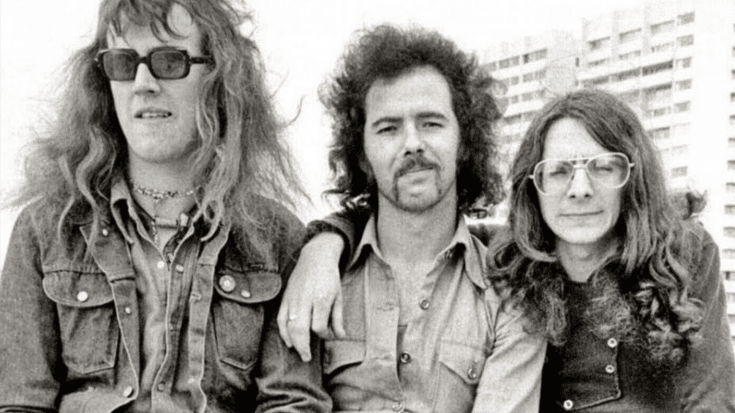9 70s Rock Bands That You Forgot Existed (But Deserved More Recognition)

via Errol Flâne / YouTube
The 1970s introduced numerous rock bands, some of which, despite their talent, didn’t achieve lasting fame. Here are ten such bands that, though lesser-known today, made significant contributions to rock music.
Budgie
Formed in Cardiff, Wales, in 1967, Budgie was a pioneering heavy metal band. Their music blended hard rock with progressive elements, featuring Burke Shelley’s distinctive vocals and bass lines. Despite their influence on later metal acts, they didn’t achieve widespread commercial success. Albums like “Bandolier” showcased their dynamic range and musical innovation. Songs such as “Breadfan” and “Napoleon Bona-Part One and Two” highlighted their complex compositions. Though not widely recognized, Budgie’s work has been acknowledged by bands like Metallica, who covered “Breadfan,” bringing renewed attention to their music.
The Sensational Alex Harvey Band
Emerging from Glasgow, Scotland, in 1972, The Sensational Alex Harvey Band combined rock with theatrical performances. Frontman Alex Harvey’s charismatic stage presence and storytelling set them apart. Their eclectic style included elements of blues, glam, and hard rock. Albums like “Next…” featured tracks such as “The Faith Healer” and “Vambo Marble Eye,” which showcased their versatility. Despite a dedicated following in the UK, they struggled to gain international acclaim. Their innovative approach influenced future artists, but mainstream success remained elusive.
Big Star
Hailing from Memphis, Tennessee, Big Star formed in 1971. They crafted melodic pop-rock with introspective lyrics. Despite critical acclaim, commercial success evaded them. Their debut album, “#1 Record,” featured songs like “Thirteen” and “In the Street,” reflecting their songwriting prowess. Internal conflicts and distribution issues hindered their progress. Over time, Big Star’s influence grew, inspiring bands like R.E.M. and The Replacements. Their music remains a touchstone for power pop enthusiasts.
Camel
Formed in Guildford, England, in 1971, Camel was a progressive rock band known for intricate instrumentals. Led by guitarist Andy Latimer, they blended jazz and classical influences. Their 1975 album “The Snow Goose” was an instrumental concept piece, showcasing their musical storytelling. Despite their technical skill, they didn’t achieve the fame of contemporaries like Yes or Genesis. Camel’s dedication to their craft earned them a loyal fanbase, and their music continues to be celebrated within progressive rock circles.
April Wine
April Wine, formed in Halifax, Nova Scotia, in 1969, blended hard rock with melodic hooks. Their 1975 album “Stand Back” achieved success in Canada, featuring hits like “Oowatanite.” International recognition grew with “The Whole World’s Goin’ Crazy” in 1976. Despite their talent, they didn’t achieve the same level of fame globally. April Wine’s consistent output and touring helped maintain a dedicated fanbase, and their music remains a staple in Canadian rock history.
Nazareth
Formed in Dunfermline, Scotland, in 1968, Nazareth gained prominence with their 1975 album “Hair of the Dog.” The title track and their cover of “Love Hurts” showcased their hard rock style. Despite these hits, they didn’t achieve sustained mainstream success. Nazareth’s gritty sound and relentless touring cultivated a loyal following. Their influence can be seen in bands that followed, but they remain underappreciated in the broader rock narrative.
UFO
UFO, a British rock band formed in 1968, blended hard rock with space rock elements. Their early work had a psychedelic feel, evolving into a heavier sound with guitarist Michael Schenker’s addition in 1973. Albums like “Phenomenon” featured tracks such as “Doctor Doctor,” showcasing their dynamic range. Despite their influence on the heavy metal scene, mainstream success eluded them. UFO’s dedication to their style earned them a place in rock history, though they remain less recognized than some contemporaries.
The Pretty Things
The Pretty Things, formed in London in 1963, were pioneers of psychedelic rock. Their 1968 album “S.F. Sorrow” is considered one of the first rock operas, influencing bands like The Who. Despite their innovation, they didn’t achieve significant commercial success. The Pretty Things continued to produce music, evolving with the times while maintaining their distinctive sound. Their contributions to rock are acknowledged by enthusiasts, even if broader recognition remains limited.
Gentle Giant
Gentle Giant, a British progressive rock band formed in 1970, was known for complex compositions and diverse instrumentation. Albums like “Octopus” displayed their technical skill and creativity. Despite critical acclaim, they didn’t attain widespread popularity. Gentle Giant’s music challenged listeners, incorporating medieval and classical influences. Their dedication to pushing musical boundaries earned them a cult following, and their work continues to be appreciated by progressive rock aficionados.





















